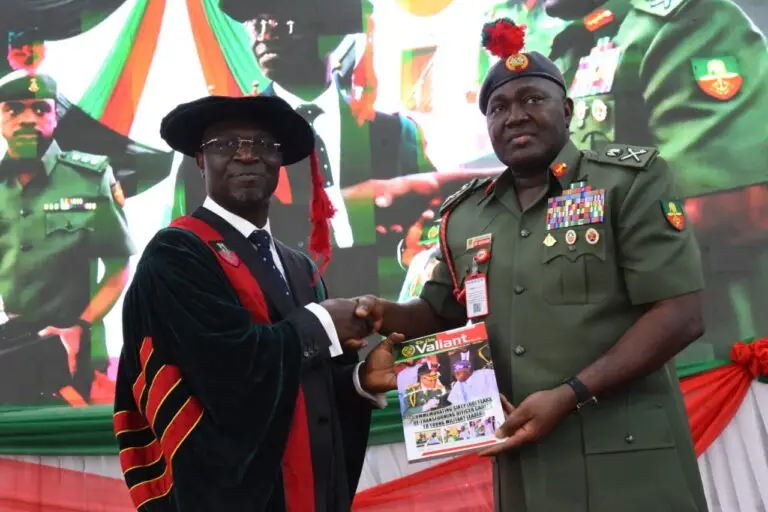News Investigators/ The Director-General General (D-G) of the Securities and Exchange Commission(SEC), Dr Emomotimi Agama, says the economic reforms introduced by President Bola Tinubu will significantly stabilise and develop the Nigerian economy.
He stated this on Wednesday in Kaduna at the Nigerian Defence Academy’s (NDA) 23rd Convocation Lecture titled ‘Pathway to Economic Prosperity for a Public Server in a Deregulated Economy’.
The lecture was part of the activities lined up for the graduating Cadets of 72 Regular Course and Post-Graduate students of the military academy.
Mr Agama said Tinubu had initiated bold and transformative reforms across key sectors in order to lay a solid foundation for inclusive growth and long-term sustainable development of the country.
Mr Agama said, ” The government had undertaken several significant macro-fiscal reforms, including the removal of fuel subsidies, the unification of exchange rates, and the tightening of monetary policy.”
According to him, through these measures, the country has made notable progress in deregulating key sectors of the economy.
“The bold decision to eliminate Nigeria’s long-standing fuel subsidy programme on May 29, 2023, was more than a fiscal adjustment.
“It marked a pivotal shift toward a deregulated economy, aimed at reducing fiscal burdens and redirecting public funds to more productive sectors.
“The move signalled the Tinubu administration’s commitment to market liberalization, allowing fuel prices to be determined by supply and demand rather than government control,” he postulated.
Mr Agama also said the government has begun scaling back electricity subsidies by adjusting tariffs, a strategy designed to enhance efficiency and attract private investment into Nigeria’s power sector.
The director-general said that to address rising inflation and support the Naira, the Central Bank of Nigeria (CBN) had adopted a tighter monetary policy stance, notably through interest rate hikes.
“These measures are part of a broader strategy to stabilise prices, restore investor confidence, and lay the foundation for a more market-oriented and resilient Nigerian economy.
“Another significant step taken by the CBN was the unification of the country’s multiple exchange rate systems, aimed at simplifying foreign exchange transactions and enhancing transparency in the currency market,” he added.
The SEC boss also spoke on the investments opportunities in the capital market and the need for the cadets to invest in order to secure their future.
Mr Agama appreciated the Commandant of NDA, Maj.-Gen. Abdul Ibrahim, for inviting him to deliver the convocation lecture, saying it was a great opportunity to make the cadets financially literate.
The director-general advised that while officers and men of the military battle to make the nation secure, “it is important they have a scheme behind them to sustain their families.
“I’m grateful to the commandant that we have this ability and this opportunity to make sure that retiring officers do not retire in penury.
“The reason why some retire in penury is because there is some lack of financial education and lack of financial support that could be generated from adequate knowledge of financial products in the capital market.”
Mr Agama explained that the capital market was providing support and condition for the people to live well after retirement.
Earlier, the Commandant, NDA, Abdul Ibrahim, appreciated the SEC official for the incisive lecture.
Maj.-Gen. Ibrahim said the NDA has been providing trainings for the Nigerian Armed Forces since 1964, with a focus on producing well-rounded commissioned officers.
According to him, the academy has adopted the National Universities Commission (NUC) Core Curriculum and Minimum Academic Standard (CCMAS) requirements to ensure quality and competitiveness in its programmes.
He added that NDA provides intensive professional training, including physical fitness, weapons handling, and tactical manoeuvres, to prepare cadets for the national defence and security challenges.
Maj.-Gen. Ibrahim said the Post-Graduate students undergo programmes in military science, defence and strategic studies, psychology, technology, and national development, aiming to develop students’ critical thinking and research skills.
He said the NDA had bilateral partnerships with foreign military academies, providing opportunities for cadets to complete the final year of their training abroad and enhancing regional defence cooperation.
NAN
